Medical expert of the article
New publications
Preparations
Ointments for acne on the face
Last reviewed: 03.07.2025

All iLive content is medically reviewed or fact checked to ensure as much factual accuracy as possible.
We have strict sourcing guidelines and only link to reputable media sites, academic research institutions and, whenever possible, medically peer reviewed studies. Note that the numbers in parentheses ([1], [2], etc.) are clickable links to these studies.
If you feel that any of our content is inaccurate, out-of-date, or otherwise questionable, please select it and press Ctrl + Enter.
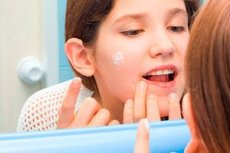
Everyone has encountered acne on the face, so everyone is familiar with the attempts to choose the most effective medicine to eliminate this problem. There are many drugs that can get rid of rashes on the skin and improve its condition. The most popular remedy is considered to be ointment for acne on the face.
 [ 1 ]
[ 1 ]
Release form
Among the most popular ointments for acne, which are made on the basis of plant elements, are the following: streptocide, sulfur, salicylic, synthomycin, as well as retinoic, erythromycin, Vishnevsky and ichthyol.
Salicylic ointment
Since salicylic acid is one of the main active ingredients of many drugs that help fight problem skin, it is obvious that an ointment based on it will be very effective. Its properties allow it to dry out pimples, which helps eliminate them. The ointment should be applied pointwise, only to the inflammation sites, because otherwise healthy areas of the skin may dry out. Another advantage of salicylic ointment is that it has bleaching properties, which allows it to remove spots left by pimples.
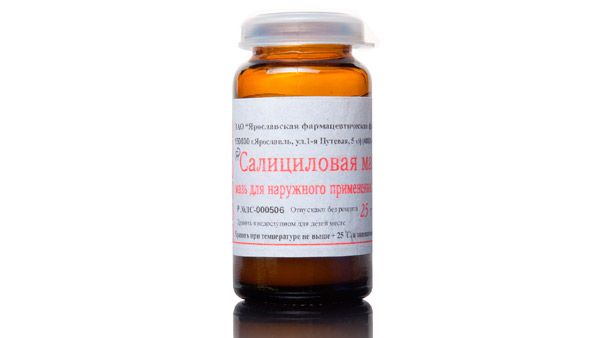
Vishnevsky ointment
Vishnevsky ointment is very effective in eliminating acne symptoms. Among its main components are castor oil, tar, and xeroform. Among the features of using this medicine is that it is necessary to use a bandage when applying it. Even if you are treating a single small pimple, after the procedure you should cover it with gauze, which is secured with a bandage. A mask also helps well, which is made by applying the ointment to a sterile gauze bandage in which holes are pre-made for the nose and eyes. A similar method is used if there are multiple foci of inflammation on the face - the mask must be kept on for several hours. The ointment helps draw pus out of the wounds and heal minor injuries. If you use the mask for a long time, you can reduce the scars left after removing acne.
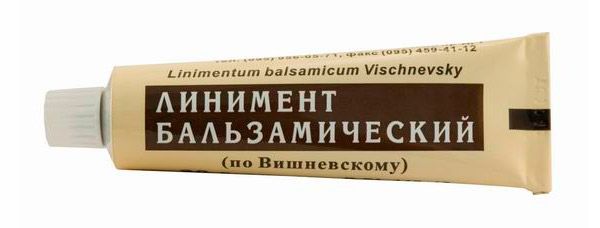
Ichthyol ointment
The medicine has anti-inflammatory properties, so it can effectively fight pustules, provoking the process of their maturation. The main warning before using this ointment is that it should be applied pointwise, in small quantities.
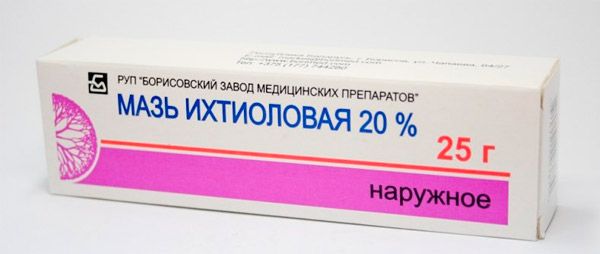
Heparin ointment
When exposed to the skin, heparin ointment releases sodium heparin, which eliminates inflammation, acts as a local analgesic, and also has an antithrombotic effect.
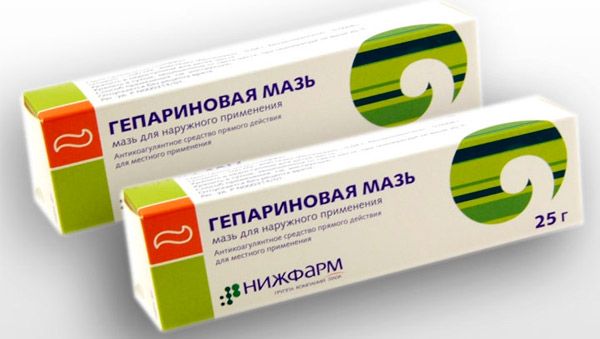
Zinc ointment
The ointment is made on the basis of zinc, which helps to quickly and effectively restore the skin. Among the main properties of this medicine: antibacterial and drying. In addition, the ointment helps to reduce the blockage of pores, as it reduces the rate of production of subcutaneous fat by the sebaceous glands. The healing effect of the ointment helps to remove ulcers, wounds and scars that may remain after eliminating acne. The ointment also reduces the possibility of scar formation - reddened areas become lighter. The combination of petroleum jelly and zinc helps to improve the elasticity of the epidermis. The severity of irritation and inflammation is also reduced.
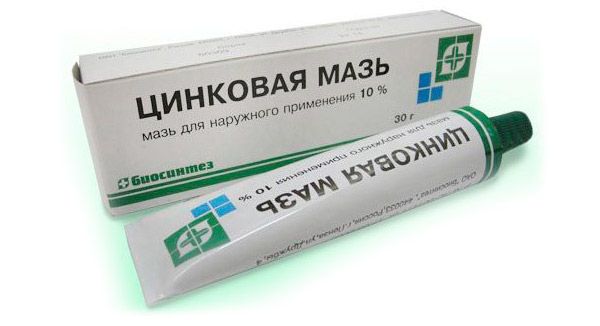
Zinerit
Zinerit is considered one of the best medicines against acne. To obtain the ointment, you need to mix the solvent and powder, which are sold in the kit. The composition of the ointment is safe, but it contains erythromycin, a fairly powerful antibiotic. Thanks to zinc, which is also in the composition of the drug, oily shine is removed from the face.
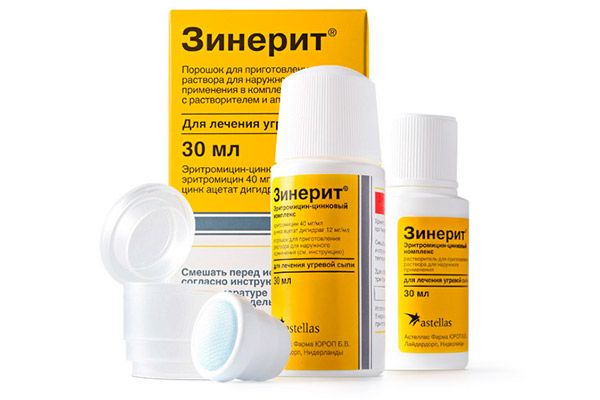
Sulfur ointment
The main component of the ointment is sulfur, which has antibacterial and disinfectant properties. After getting on the skin, it immediately begins to destroy parasites, microbes and fungi. In addition, the ointment regenerates the skin - heals damage, removes keratinized epithelium, and softens the skin.
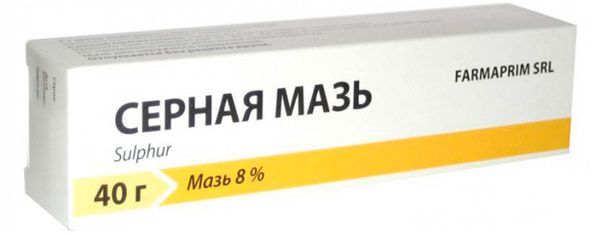
All active ingredients of the ointment penetrate deeply under the skin. At the same time, a person may feel a slight burning and itching on the treated areas of the skin - this is a normal reaction.
Baziron
Baziron is a disinfectant ointment that destroys bacteria that cause acne. Among the properties of the drug: moisturizing and keratolytic effects, stabilization of blood flow, pore cleansing, and the so-called scrub effect.
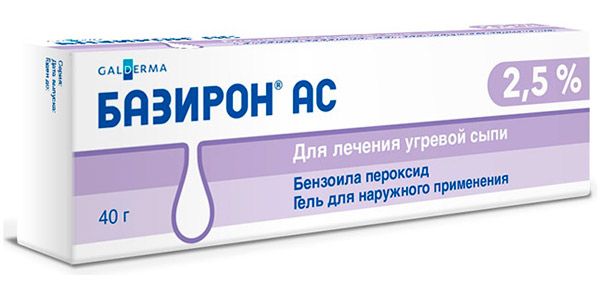
In addition, the ointment exfoliates dead cells, opens pores and moisturizes the skin. The medicine helps stabilize the function of the sebaceous glands, as a result of which sebaceous plugs are eliminated. The oiliness of the skin decreases, swelling and redness disappear.
Another advantage of this ointment is that bacteria have no immunity to it. This is achieved thanks to peroxide, which has such an effect on them.
Calendula ointment
The ointment, which is made from calendula herbs, gently affects the skin, removes scars and spots that remain after acne. It also contains petroleum jelly, which helps to expand pores, as a result of which comedones do not form on the skin. Petroleum jelly prevents moisture penetration, protects the wound from negative external factors, and also restores tissue. If you have deep inflamed acne, you should use calendula ointment, since it is able to quickly stop inflammation.
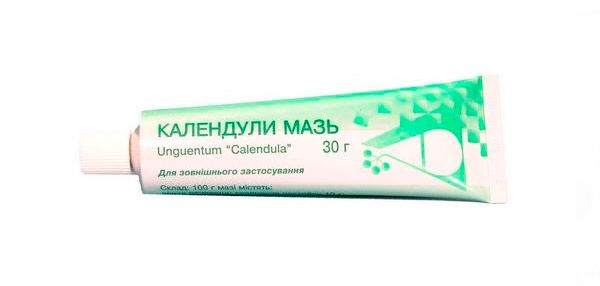
 [ 9 ]
[ 9 ]
Retinoic ointment
Regular use of retinoic ointment helps reduce skin oiliness. In addition, the ointment has antibacterial properties, which is why it is often used as a means of eliminating acne.
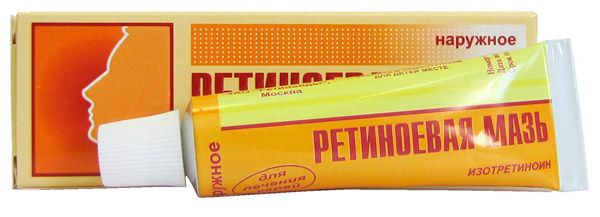
Antibiotic Ointments for Acne on Face
The most popular antibiotic ointments for acne are topical preparations such as:
- Skinoren, which contains nonanedioic acid, which has antimicrobial properties. The ointment should be applied to dry, clean skin, gently rubbing it into the inflamed areas. It should be remembered that Skinoren can cause side effects - peeling, itching or burning.
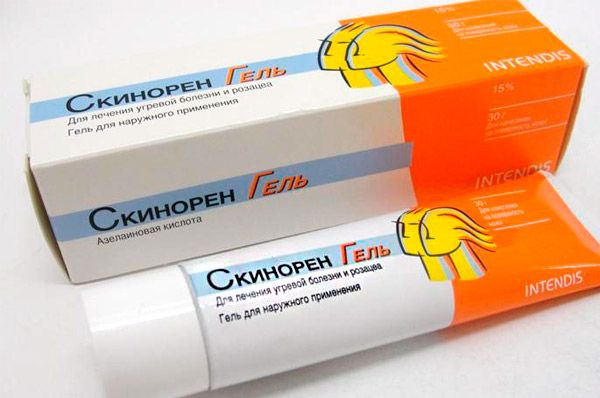
- Differin, which copes well with acne. It is necessary to rub the drug into the inflamed area with massaging movements, preferably in the evening, before going to bed. It should be noted that this medicine is prohibited during pregnancy and lactation. If irritation occurs, the use of the ointment should be discontinued. The effect of using Differin will be noticeable after 2-3 months.
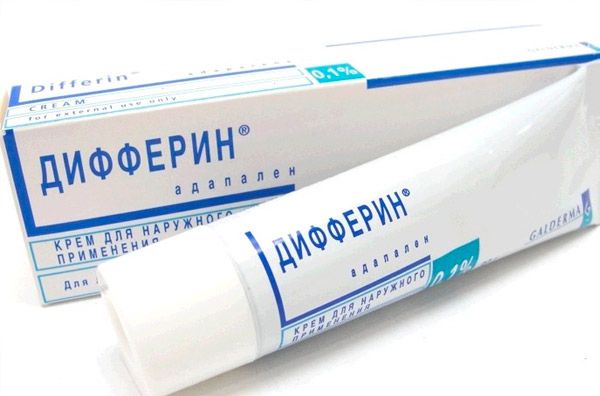
Tetracycline ointment
Tetracycline ointment contains tetracycline, which is an antibiotic with antibacterial properties (destroys streptococci and staphylococci). Due to this, the ointment is used to eliminate acne and pimples. The method of applying this medicine is slightly different from others - other ointments need to be applied pointwise only to the site of inflammation, but tetracycline should be applied in a thin layer directly to the skin (sometimes even to the entire face).
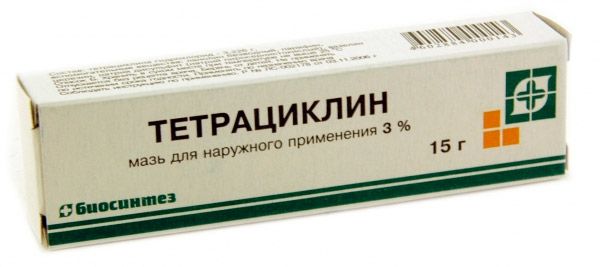
Levomekol
The main components of Levomekol ointment are levomycetin and methyluracil. Among the main properties of this medicine are: cleansing the skin of pus, healing damaged tissue, eliminating redness and evening out skin color, reducing swelling, and also having an anti-inflammatory effect.
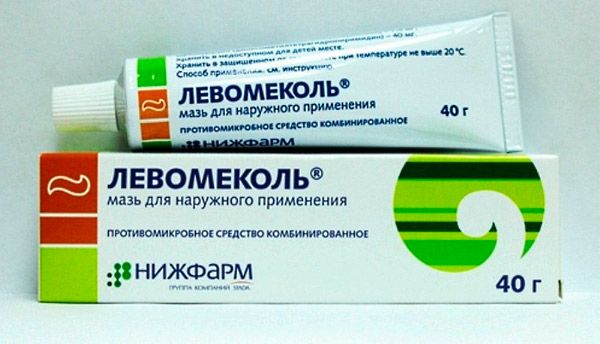
Synthomycin ointment
Syntomycin ointment is a universal disinfectant that effectively eliminates inflammation, which is why it is often used to treat acne in various locations. It is very important to follow the dosage - before each new application, clean the skin from the previous layer of ointment. Spot treatment of acne will be most effective.
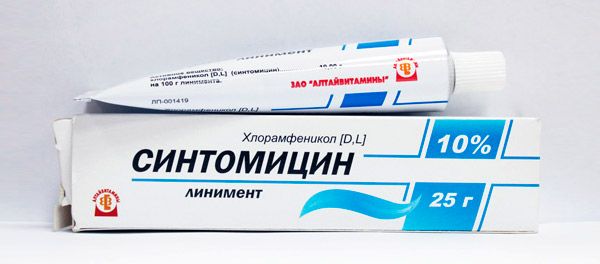
Hormonal ointments for acne on the face
The most popular and effective hormonal ointments for acne on the face are Triderm and Sinaflan. These ointments cannot be used for a long time due to the development of local skin atrophy. Ointments, due to their complex composition (antibiotic + corticosteroid), help relieve inflammation, dry the skin, and also have an antibacterial effect. But they also have disadvantages - they usually negatively affect the functioning of internal organs, and in addition, disrupt the metabolic process. Because of this, these drugs, like other hormonal ointments, are recommended to be used only with a doctor's prescription.
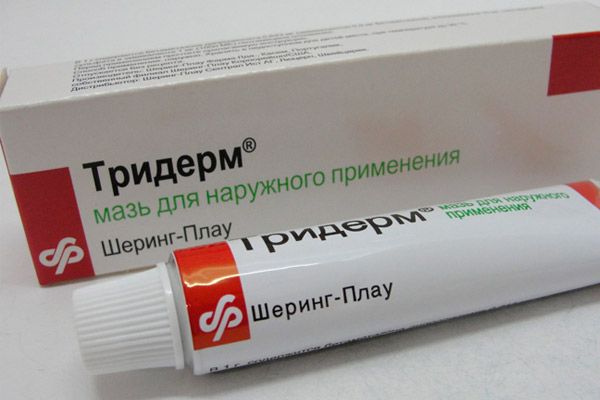
Ointments for spots on the face after acne
To remove spots left by acne after their removal, it is recommended to use ointments made on the basis of nonanedioic, salicylic, hydroxyethanoic acid. Among them:
Zinc, salicylic, ichthyol, and syntomycin ointments. They should be applied to the inflamed areas for 1 hour, then washed off with water. The spots disappear after about 1 week;
A very effective ointment is made from badyagi, which is prepared in the following way - mix 1 tbsp. of this powder, as well as 3-5 drops. of hydrogen peroxide (3%). The resulting ointment is applied to pimples and left for 15 minutes, then washed off. While the ointment is working, a burning sensation is felt, and after the procedure the skin may turn red, so it is better to carry out the treatment at night. Thanks to the medicine, the intensity of blood flow in the area of inflammation increases, and in addition, the skin exfoliates.
Ointments for internal (subcutaneous) acne on the face
The following ointments are most effective against subcutaneous acne:
- Clindovit, as well as Dalacin (antibiotics with bactericidal and bacteriostatic properties);
- Levomekol is an ointment with anti-inflammatory, healing and antibacterial properties;
- Ichthyol, zinc and Vishnevsky ointments are anti-inflammatory antiseptic agents that relieve pain and quickly clear the skin of pus.
The properties of ointments for acne on the face are discussed using retinoic ointment as an example.
Pharmacodynamics
This acne ointment stabilizes terminal cell differentiation, which complicates the process of detritus formation and slows down epithelial hyperproliferation. As a result, the rate of sebum production decreases, thereby reducing inflammation in the sebaceous glands and normalizing the skin condition.
Using Ointments for Acne on Face During Pregnancy
Anti-acne ointments are prohibited during pregnancy. The only exception is Skinoren, but it can only be used after permission from the gynecologist who is monitoring the pregnancy. This ointment should be applied in a thin layer pointwise to the areas of inflammation several times a day.
Dosing and administration
Before applying heparin ointment, you need to clean the skin and treat it with an alcohol-based solution. The application procedure should be carried out twice a day, lubricating the site of inflammation with a thin layer. It should be remembered that during the treatment of acne with heparin ointment, you cannot use decorative cosmetics.
Tetracycline ointment is also applied in a thin layer. To apply it, a gauze bandage is used - it is first folded in several layers, then treated with the medicine, and then fixed on the face with a plaster. This bandage should be kept on the face for 12 hours.
Zinerit is applied twice a day in an even thin layer to previously cleansed skin. The ointment package contains a special applicator that simplifies the treatment process - with its help, application occurs faster.
Retinoic ointment should be applied to the inflamed areas twice a day, avoiding the substance getting into the mouth or eyes during the treatment. The course of treatment can last 4-6 weeks, and if necessary, a repeat course can be prescribed.
Contraindications
A contraindication to the use of any ointment is hypersensitivity to individual components of the drug.
If we talk about particulars, tetracycline ointment cannot be used if the patient has problems with the liver or fungal diseases. Ichthyol ointment is prohibited if the skin has recently been treated with chemical peeling or laser resurfacing (at least 7 days must pass after such a procedure), as well as for children under 12 years old. Heparin ointment cannot be used in case of poor blood clotting, open purulent wounds and in case of a sharp decrease in the number of platelets in the blood.
Interactions with other drugs
Heparin ointment should not be combined with antihistamines, NSAIDs, as well as tetracycline and thyroxine.
Ichthyol ointment should not be combined with iodides, alkaloids, or heavy metal salts.
Retinoic ointment contains isotretinoin, the effectiveness of which decreases when combined with GCS and tetracycline antibiotics. It is also prohibited to combine it with retinol, differin or retasol ointments, because this can cause the development of hypervitaminosis type A. In addition, retinoic ointment cannot be combined with other drugs that cause photosensitivity.
Attention!
To simplify the perception of information, this instruction for use of the drug "Ointments for acne on the face" translated and presented in a special form on the basis of the official instructions for medical use of the drug. Before use read the annotation that came directly to medicines.
Description provided for informational purposes and is not a guide to self-healing. The need for this drug, the purpose of the treatment regimen, methods and dose of the drug is determined solely by the attending physician. Self-medication is dangerous for your health.

